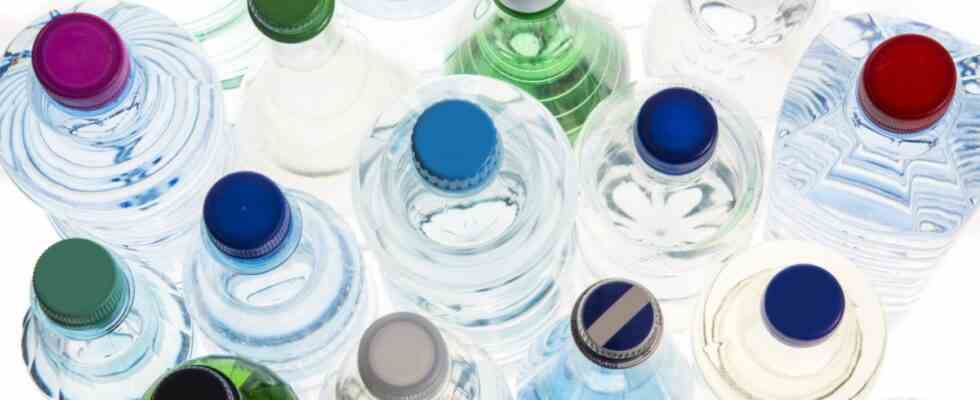A sprayed-on cross on the ground, above it a heavy drill rig, maneuvered on trolleys. Not long ago, the Upper Bavarian town of Töging am Inn began drilling for its new drinking water well. In the meantime, the water-bearing gravel layer has been reached, and another drill should drive the hole further down to a depth of 80 meters. Because Töging cannot use groundwater that is comparatively close to the surface like most municipalities, but has to fall back on deep groundwater – possibly water from the same deep layer that is tapped a few hundred meters south on the other side of the Inn. In the community of Polling, a company wants to bottle the particularly clean water from the depths as mineral water in the future. This met with resistance not only in Töging, but also among many Pollinger citizens.
Lena Koch, for example, is one who opposes Innfood’s plans for mineral water. She represents the Greens in the Pollinger municipal council and is soon to vote again on a change in the development plan for the local Weiding industrial area. There in Weiding there have been half a dozen deep wells, some more than 150 meters deep, for decades. The water was always used for food production, for example for baby food from the glass or for gentle apple juice for the little ones. This happened under the Nestlé umbrella until 2015, when the Swiss group sold the company, which the current owners named Innfood three years ago. While the Schwarz Group, which also owns the discounter Lidl, abandoned similar plans for Weiding a few years ago, Innfood now wants to enter the mineral water business with a French partner and sell deep water from two of Weiding’s wells in PET bottles – on the regional market, according to Weiding.
However, a number of polling people around the Green councilor Koch and the regional citizens’ initiative “Network Drinking Water” (BINT) want to prevent all this. The nearby district town of Mühldorf is criticizing it because it fears additional heavy traffic on its Inn bridge, and Töging has also spoken out against the Pollinger plan. Initially, it’s just a matter of reallocating the space in the plant that is no longer needed for the expansion of the sewage treatment plant in such a way that Innfood can build a bottling hall for bottled water on it.
For the opponents, this is just a first step that needs to be prevented. Because the valuable deep water should not be sacrificed for commercial purposes. The people of Töging demand that their own interest in municipal supply must take precedence over private profit-seeking. Töging’s previous water protection area has been cut through by the A94 since 2012, and the neighboring municipality of Erharting has also settled a large logistics center there, against the resistance of the city. But even the critics in Polling themselves see the deep water as a public good that should be preserved for future generations instead of as a raw material – in Bavaria, by the way, free of charge – to help a company make substantial profits.
Lena Koch has plenty of praise for Innfood. It is “a great sign” that the company currently only needs and pumps one million cubic meters of water – 600,000 cubic meters less than was previously pumped and has been approved to date. From their point of view, the amount saved should remain in the depths instead of being sold in bottles. It is about water as the basis of life for children, grandchildren and even more distant generations, says Koch. “How long are we going to be so reckless with it?” According to their own statements, their fellow campaigners have already collected more than 4,500 signatures. In September, they handed over part of it to the chairwoman of the environmental committee in the state parliament, Rosi Steinberger, to give emphasis to a petition to parliament.
Polling’s mayor Lorenz Kronberger sees himself primarily responsible for the development plan.
(Photo: UWG Polling)
Like the Pollinger Initiative, the state government also attaches great importance to the protection of deep groundwater because it should be reserved for future generations as a drinking water reserve. It even allows itself a veritable dispute with the small, rural drinking water suppliers. In order to protect the deep groundwater, she wants to significantly tighten the specifications for its use, which the suppliers strictly reject. The state government sees things differently when it comes to mineral, healing and thermal water, at least if they are “officially recognized”, as stated in the draft of a new leaflet for dealing with deep water. The specifications for such “high-quality uses” are so strict that “they are usually only met by deep groundwater”.
At least in part, this corresponds to the attitude of Polling’s non-partisan mayor Lorenz Kronberger, who says he sees himself being pushed into the role of project advocate, even though he only has to handle one development plan procedure. However, Kronberger is not at a loss for arguments in favor of the project. One is aimed at “high-quality use”: the bottled mineral water is drunk after all, while the water that the people of Töging wanted to pump is then also used for showering and flushing toilets. In addition, a number of other communities and many breweries also use the deep water. And that is currently being promoted in much smaller quantities in Weiding than would be permitted.
Kronberger is said to be less worried than his colleague Windhorst in Töging or Lena Koch and the BINT about whether, in view of climate change, there will be as much deep water in the future as there has been in the past. In addition to the development plan, they already have the next steps in mind. The funding permits for two wells in Weiding will expire in the near future. And in their opinion, the authorities should not simply continue to extend the funding as before.

